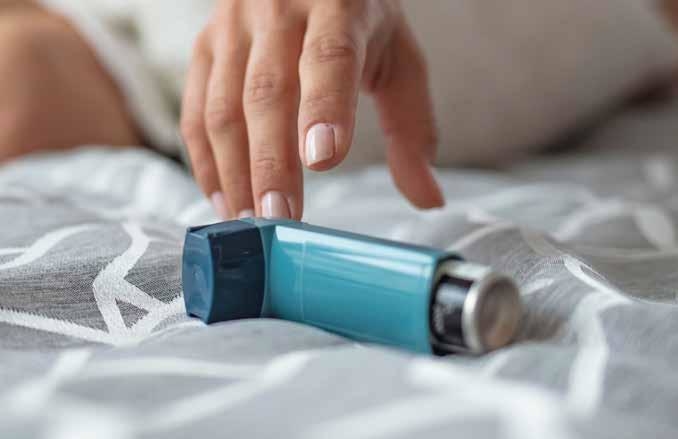Reducing the carbon emissions of inhalers
- 18 June 2023
- 4 min read
An interview with Laura Wiffen, Respiratory Research Fellow, Portsmouth Hospitals University NHS Trust (PHU)
The NHS contributes around 23 million tonnes of CO2 per year, with 3% of that footprint down to inhalers. We caught up with Laura Wiffen, to discuss the research she’s conducting that will hopefully help to shape inhaler prescribing practices for the future.
Development of the REDUCE Carbon Study began just before the COVID-19 pandemic, right as the green agenda was starting to come to the fore. We recognised the significant carbon footprint of the NHS and how much of that was contributed to by inhalers. There are many different types of inhalers available to prescribe, across the UK we prescribe a higher number of metered dose inhalers which also have the highest carbon footprint. Within Wessex, we have recently updated our prescribing guidelines to include the carbon footprint information for each inhaler.
Through the REDUCE carbon study we wanted to explore prescribing behaviours to try and understand what it is that makes people choose one inhaler over another and whether additional knowledge of the carbon footprint would impact prescribing preferences. This information would hopefully serve to support the production of more comprehensive asthma management guidelines, facilitate a drive to greener inhaler prescribing practices, support the widespread inclusion of carbon footprint data in national and regional prescribing guidelines to ensure a consistent message and highlight the need for a standardised and inclusive ‘carbon data’ value for inhaler devices.
The REDUCE Carbon study
The REDUCE Carbon study is online and can be completed on a computer, tablet or phone and should take no more than 10 minutes to complete. It is based on the Wessex asthma guidelines and uses case studies, asking participants to rank inhaler choices using information including, cost, dosing schedule and for some participants, the carbon footprint. The study is randomised, so half the participants will get the carbon footprint of each inhaler on their guidelines and half won’t. It is not a test of clinical practice at all and we are asking all healthcare professionals to take part.

Over 1,800 people have completed the survey so far spread across different healthcare institutions, professions and specialties within Wessex. However, our recruitment drive must continue; we would like to include as many health care professionals as possible from as many different backgrounds and specialities to really be able to understand the drivers and factors that influence their choices.
Research for healthcare professionals

Most research studies are not usually targeted at healthcare professionals. REDUCE Carbon has given us an invaluable opportunity to target a population that is often underserved by research, giving them a voice and allowing them to be involved in change. In particular we undertook a night-time trolley dash, to capture those individuals who work night shifts, who would not generally see the research team or get the chance to be involved in research because it doesn’t often happen beyond 9-5. Making this research visible also allows for invaluable education opportunities to be delivered alongside the study. I’ve really enjoyed being able to do something
“Over 1,800 people have completed the survey so far spread across different healthcare institutions, professions and specialties within Wessex.” for healthcare professionals, providing education opportunities and supporting development at the same time as bringing colleagues with us on our journey to influence and support change.
The challenges and opportunities
Initial engagement to the study was a challenge. We learnt early on that simply sending out emails was not going to help us achieve the participation we were hoping for. So we adapted our delivery methods, with significant efforts from the PHU respiratory research delivery team visiting the wards. We had been kindly donated a number of seed packs by Garson’s Farm to support recruitment. This has been a huge success, however we recognise that this method of delivery is not necessarily applicable to other trusts and primary care. A challenge has been how we broaden recruitment outside of PHU and this has been something that requires new ways of thinking. We need to better understand how different sites work and how we can embed research into teams with varying levels of research delivery support. The CRN delivery teams have been pivotal in increasing recruitment across community sites and primary care.
When it comes to the opportunities, there are some exciting ones. The REDUCE Carbon study has given us an opportunity to build on what COVID-19 did for research and involve as many healthcare professionals as we can across the Wessex region. Everyone, whether they are prescribers or not, have an impact on prescribing choices. Other regions are also including carbon footprints or recommendations for green inhalers in their guidelines, with data from the REDUCE carbon study hopefully supporting a collaborative approach to influence national guidance.
The REDUCE carbon study has also raised other important issues within the green agenda. Whilst we can encourage the prescription of ‘greener’ inhalers, most are still made from plastic and will be thrown away at the end of their use due to a current lack of recycling facilities. Patients are keen to recycle their inhalers and this study may also help to increase awareness and facilitate development of widely accessible recycling schemes.
We have an opportunity now to keep research in the limelight after COVID-19 and maintain that momentum and enthusiasm. We are incredibly grateful to everyone who has already taken part in the REDUCE study and encourage everyone who hasn’t yet taken part to have a go- thank you!
If you are a healthcare professional and would like more information about the trial, please contact laura.wiffen@porthosp.nhs.uk
Alternatively, you can take part in the study here: https://reduce.pttu.org.uk/


